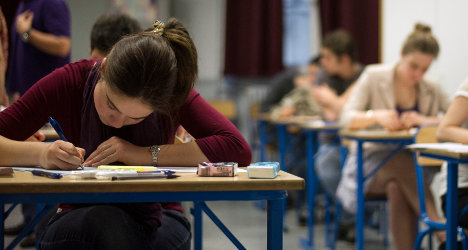French school reforms: Why the almighty fuss?

The French government’s planned education reforms aimed at ending growing inequality and elitism has kicked up a huge row. As teaching unions take to the streets in protest on Tuesday here’s a look at what's provoked their ire.
The planned reforms – aimed at making the French middle school or collége system (11 to 15 year-olds) more equal and pupils' chances of success less dependent on their backgrounds – have prompted outrage among powerful teaching unions as well as France’s right wing opposition parties.
Around 230 MPs have signed a petition demanding the government withdraw the bill and it was backed up by 20,000 signatures from members of the public.
It's been described as a "baptism of fire" for France's fairly new education minister Najat Vallaud-Belkacem, seen as a rising star of the Socialist government.
French President François Hollande and his PM Manuel Valls have been forced to defend the bill which is currently in period of consultation.
“This high school reform is being carried out for the sake of equality,” said Valls. “And to ensure that birth and social background do not dictate the fate of the children,” the PM Valls wrote in Liberation newspaper.
Holande, Valls and Vallaud-Belkacem want to tackle the rising inequality in the French school system, a worrying trend that was highlighted by an OECD report in 2013.
“In France if you belong to a disadvantaged background you are clearly less likely to succeed today than in 2003," the report said.
Most of France's teaching unions however, say the reforms are not the answer and could even lead to greater inequality as parents may be encouraged to put their children in private schools.
They have called on members to protest on Tuesday with demonstrations are expected to take place in 20 towns across the country.
These are the main reasons that have sparked their ire.
End of ‘European/bilingual classes’
The minister wants to ditch so-called "classes bilangues" , which is basically the learning of a second language from the sixth grade (ages 11/12). This option is normally taken up by high-achieving pupils (or more to the point those with parents who want them to be high achievers) - around 200,000 pupils each year.
But the minister deems them to be too elitist by being only appropriate for the most gifted students.
Opponents of the change say it will lead to less language learning, particularly German, which has even prompted Berlin’s ambassador to France to raise concerns.
Vallaud-Belkacem has insisted the reform will not mean the progressive end of German teaching in French schools and she has even announced her intention to appoint someone in the ministry to be in charge of promoting German teaching.
Although the option of "classes bilangues" will disappear from the sixth grade the reforms will make it compulsory for all pupils to learn a second ‘living’ language one year later, in the fifth grade (ages 12/13). SEE ALSO: Why elitism is dragging France down

Practical Interdisciplinary Teaching (EPI)
French teaching unions are pretty much united in opposition against a move to introduce interdisciplinary classes that would see topics taught through various themes and by various teachers working together - rather than the traditional system of one teacher - one discipline, which has firm roots in France.
Opponents in the profession fear that this will lead to teaching time being lost to each individual discipline and will introduce needless competition between teachers and only really benefit the more gifted students.
Less teaching of Latin/Greek
With this in mind Vaullaud –Belkacem initially envisaged dropping the teaching of Latin and Greek, options which are still taken by a minority of French pupils and replace it with an interdisciplinary class on "Ancient Languages and Cultures"
However after teachers of classics languages reacted angrily, the minister took another look at the reform and decided to include another option for those who want to learn Latin.
Changes to history teaching
This is an area that has provoked fierce debate in France in recent weeks. The changes to the way history is taught is not actually part of Vallaud-Belkacem’s reform, but by the ministry’s review of the curriculum. The move suggests bringing in both obligatory and optional subjects that teachers can include as part of the course, with the main controversy surrounding which themes should indeed be obligatory.
The right and the extreme right in France complained that the history of Christianity would lose out to the teaching of the history of Islam. Others have denounced a plan to teach the history of France with an emphasis on “repentance” when it comes to subjects like the slave trade and colonialism.
Freedom for teachers
The government also wants to boost independence for each middle school to allow each establishment to determine 20 percent of the curriculum. But teachers fear this will leave too much power in the hands of headteachers. Unions also fear that this will actually lead to a system even more unequal than it is today.
Analysis

British author Peter Gumbel, who has written books on the elitism and the French education system said the current uproar is indicative of the obstacles every government faces in trying to reform France’s education system.
“What’s interesting is that it’s the same people who say we have to reform the school system who are now screaming their opposition because they are trying to change something.
“These reforms are not even a major upheaval. They will simply introduce more flexibility and give teachers a little more say over what they teach.
“They are aimed at reversing the ongoing decline in performance but it’s really only scratching at the surface and people are screaming as though they are ripping down the pillars of the education system.
“The fuss that has been created is really out or proportion with the scale of reform. It’s just indicative of how hard it is to change France’s education system.”
Gumbel puts that difficulty down to numerous lobbyist groups and powerful unions within the education system that battle to defend their own interests as well as the fact the French system is overly centralised.
“The schools system in France is so micromanaged that any change is going to be screamed at,” he said. “Union leaders have all the power because it’s so centralised.”
“What they need to do is give teachers a long list of subjects they can teach, show them how the pupils will be marked on it and tell them to go away and teach it,” he said.
Peter Gumbel is the author of the book "On Achève Bien les Ecoliers" which prompted much soul -searching in France over its education system and was acclaimed by the French press.
Comments
See Also
The planned reforms – aimed at making the French middle school or collége system (11 to 15 year-olds) more equal and pupils' chances of success less dependent on their backgrounds – have prompted outrage among powerful teaching unions as well as France’s right wing opposition parties.
Around 230 MPs have signed a petition demanding the government withdraw the bill and it was backed up by 20,000 signatures from members of the public.
It's been described as a "baptism of fire" for France's fairly new education minister Najat Vallaud-Belkacem, seen as a rising star of the Socialist government.
French President François Hollande and his PM Manuel Valls have been forced to defend the bill which is currently in period of consultation.
“This high school reform is being carried out for the sake of equality,” said Valls. “And to ensure that birth and social background do not dictate the fate of the children,” the PM Valls wrote in Liberation newspaper.
Holande, Valls and Vallaud-Belkacem want to tackle the rising inequality in the French school system, a worrying trend that was highlighted by an OECD report in 2013.
“In France if you belong to a disadvantaged background you are clearly less likely to succeed today than in 2003," the report said.
Most of France's teaching unions however, say the reforms are not the answer and could even lead to greater inequality as parents may be encouraged to put their children in private schools.
They have called on members to protest on Tuesday with demonstrations are expected to take place in 20 towns across the country.
These are the main reasons that have sparked their ire.
End of ‘European/bilingual classes’
The minister wants to ditch so-called "classes bilangues" , which is basically the learning of a second language from the sixth grade (ages 11/12). This option is normally taken up by high-achieving pupils (or more to the point those with parents who want them to be high achievers) - around 200,000 pupils each year.
But the minister deems them to be too elitist by being only appropriate for the most gifted students.
Opponents of the change say it will lead to less language learning, particularly German, which has even prompted Berlin’s ambassador to France to raise concerns.
Vallaud-Belkacem has insisted the reform will not mean the progressive end of German teaching in French schools and she has even announced her intention to appoint someone in the ministry to be in charge of promoting German teaching.
Although the option of "classes bilangues" will disappear from the sixth grade the reforms will make it compulsory for all pupils to learn a second ‘living’ language one year later, in the fifth grade (ages 12/13). SEE ALSO: Why elitism is dragging France down

Practical Interdisciplinary Teaching (EPI)
French teaching unions are pretty much united in opposition against a move to introduce interdisciplinary classes that would see topics taught through various themes and by various teachers working together - rather than the traditional system of one teacher - one discipline, which has firm roots in France.
Opponents in the profession fear that this will lead to teaching time being lost to each individual discipline and will introduce needless competition between teachers and only really benefit the more gifted students.
Less teaching of Latin/Greek
With this in mind Vaullaud –Belkacem initially envisaged dropping the teaching of Latin and Greek, options which are still taken by a minority of French pupils and replace it with an interdisciplinary class on "Ancient Languages and Cultures"
However after teachers of classics languages reacted angrily, the minister took another look at the reform and decided to include another option for those who want to learn Latin.
Changes to history teaching
This is an area that has provoked fierce debate in France in recent weeks. The changes to the way history is taught is not actually part of Vallaud-Belkacem’s reform, but by the ministry’s review of the curriculum. The move suggests bringing in both obligatory and optional subjects that teachers can include as part of the course, with the main controversy surrounding which themes should indeed be obligatory.
The right and the extreme right in France complained that the history of Christianity would lose out to the teaching of the history of Islam. Others have denounced a plan to teach the history of France with an emphasis on “repentance” when it comes to subjects like the slave trade and colonialism.
Freedom for teachers
The government also wants to boost independence for each middle school to allow each establishment to determine 20 percent of the curriculum. But teachers fear this will leave too much power in the hands of headteachers. Unions also fear that this will actually lead to a system even more unequal than it is today.
Analysis

British author Peter Gumbel, who has written books on the elitism and the French education system said the current uproar is indicative of the obstacles every government faces in trying to reform France’s education system.
“What’s interesting is that it’s the same people who say we have to reform the school system who are now screaming their opposition because they are trying to change something.
“These reforms are not even a major upheaval. They will simply introduce more flexibility and give teachers a little more say over what they teach.
“They are aimed at reversing the ongoing decline in performance but it’s really only scratching at the surface and people are screaming as though they are ripping down the pillars of the education system.
“The fuss that has been created is really out or proportion with the scale of reform. It’s just indicative of how hard it is to change France’s education system.”
Gumbel puts that difficulty down to numerous lobbyist groups and powerful unions within the education system that battle to defend their own interests as well as the fact the French system is overly centralised.
“The schools system in France is so micromanaged that any change is going to be screamed at,” he said. “Union leaders have all the power because it’s so centralised.”
“What they need to do is give teachers a long list of subjects they can teach, show them how the pupils will be marked on it and tell them to go away and teach it,” he said.
Peter Gumbel is the author of the book "On Achève Bien les Ecoliers" which prompted much soul -searching in France over its education system and was acclaimed by the French press.
Join the conversation in our comments section below. Share your own views and experience and if you have a question or suggestion for our journalists then email us at [email protected].
Please keep comments civil, constructive and on topic – and make sure to read our terms of use before getting involved.
Please log in here to leave a comment.